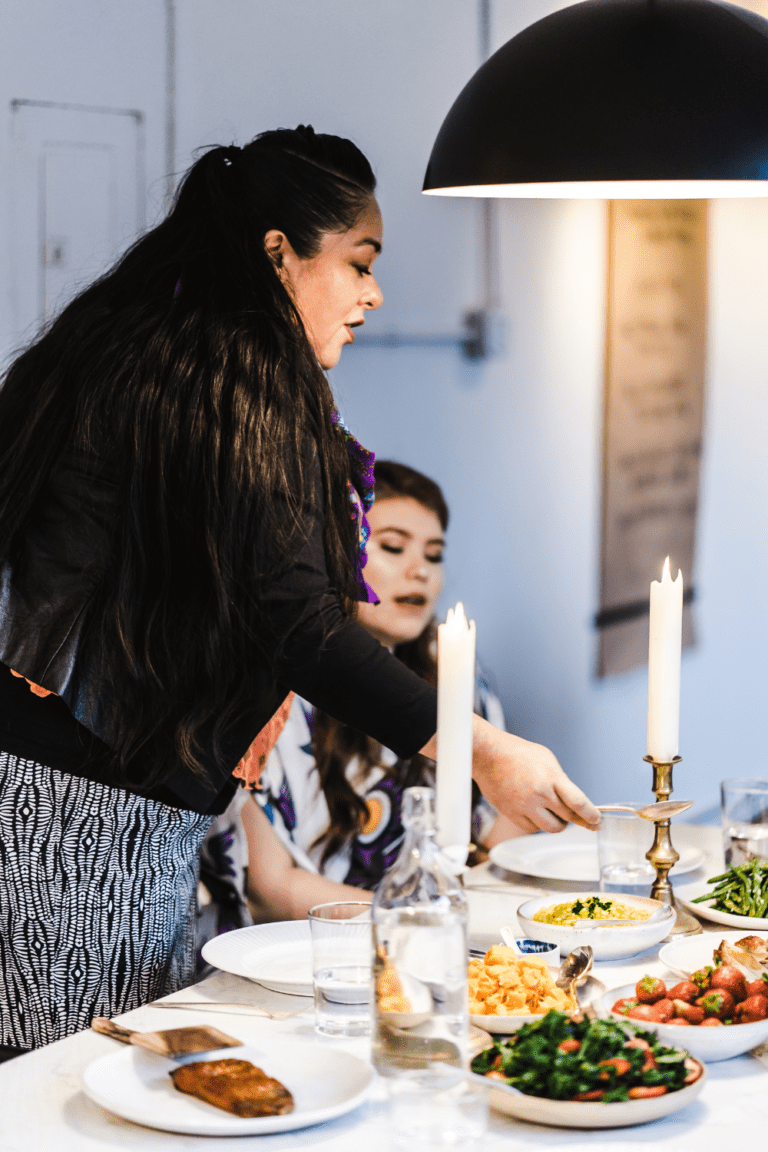
[ad_1]
The holiday season can be triggering for anyone who has ever had a disordered relationship with food. It’s a time of year when many gatherings seem to center around eating.
Picture this: you show up at a holiday party, and the first conversation you hear is a co-worker or family member talking about their latest diet and why they’re refusing the dessert tray. *cue eye roll* Diet talk gets especially loud once the New Year arrives, and those moments make it easy to get pulled into the diet culture mindset. But this year, let’s try something different.
How can we resist getting sucked into the diet culture vortex? Intuitive eating.
Intuitive eating is based on ten main principles:
- Rejecting diet mentality
- Honoring your hunger
- Making peace with food
- Challenging the ‘food police’
- Feeling fullness
- Discovering the satisfaction factor
- Coping with emotions
- Respecting your body
- Exercise
- Honoring your health
The term intuitive eating wasn’t coined until 1995, although the concept has been around since the 1970s.
It sounds pretty easy, right? Most intuitive eating principles focus on listening to your body when it’s hungry, when it’s full, and what type of foods it’s craving.
We asked Kristen Browne, MS, CNS, LDN why intuitive eating doesn’t seem to come naturally to adults, and she told us “as we get older, our meals, relationships with food, and thoughts about body image are shaped by what we are fed, both literally and figuratively, by our parents, family, friends, and what we see in society.
Some people are told to ‘just take one more bite‘ or threatened with the loss of a sweet treat if they don’t first ‘clean the plate.’ Other people are shamed when they take what looks to be a larger than ‘normal’ portion or go back for seconds. That pressure to ignore our body’s natural signals for satiety and hunger, especially to fit unhealthy societal standards can start to develop into negative relationships with food later in life that often leads to disordered eating behaviors.”
Why We Ditch Diet Culture
At this point, it’s fairly common knowledge that diets don’t work in the long term. Even if they work for some people in the short term, there is a high probability of regaining that weight and potentially more. There’s also evidence that weight cycling, the process of losing and gaining weight, is actually more risky for your health than just staying at the same weight.
Unlike what diet culture tells us, hunger isn’t the enemy, and neither is food because it has no moral value— just different nutrients. Browne told us, “Intuitive eating steers away from the idea that there are ‘good’ and ‘bad’ foods, instead having the individual focus on how they feel when they consume something. Ultimately, the goal is to eat foods that make one’s body grow, thrive, and feel good, attempting to avoid eating for emotional reasons.
In addition, weight loss is typically not a goal of intuitive eating. However, for some, after making more healthy choices in the foods and beverages consumed, weight loss can sometimes be a side effect of intuitive eating.”
Weight Loss is Not the Goal of Intuitive Eating
We truly can’t say it enough: weight loss is not the goal of intuitive eating. For some people, weight loss may be a side effect of focusing on these principles. Other people maintain their current weight or even gain it. You can’t use diet success metrics with intuitive eating because it’s not a diet. It’s a mindset shift.
Intuitive eating focuses on having a healthy relationship with food and listening to your body’s needs. It is giving yourself permission to eat with curiosity and non-judgment.

One of the major benefits of this mindset shift toward listening to your body is improved psychological health. Food is something we need to live. It fuels our bodies! Having a difficult relationship with something you need to literally survive can be incredibly mentally draining. It can feel like you’re in a battle all day long.
Deconstructing diet culture and everything that society has told us about food can be immensely freeing. Studies have shown that intuitive eating improves self-esteem, body image, and overall quality of life and lessens instances of depression and anxiety. Resist the urge to fall into the diet culture trap this holiday season. You deserve to be at peace with your body and what fuels it.
[ad_2]